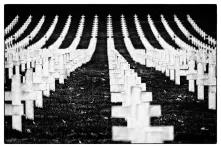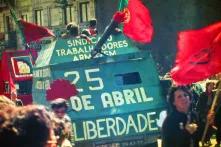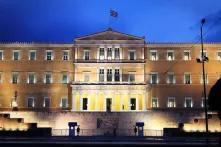The European mission is not accomplished. There are new challenges Europe has to face: internal ones like voting fatigue, growing nationalism and the rise of Eurosceptical forces.

Download Article
My grandma was born two weeks after the First World War broke out in 1914. She was four years old when the Weimar Republic replaced the German Empire. She married in 1938; five years after the Nazi party came to power. She lost her brother and her husband in the Second World War and brought her daughter up all alone, living in Chemnitz, which in the GDR became Karl-Marx-Stadt. In 1956 she handed the 13 year old over to a complete stranger in order to take her to West Berlin. My grandmother left East Germany crossing the green border by foot. For safety reasons they could not get away together.
The girl was my mother. I was born in 1965. Neither I, nor my husband or my two teenage sons ever experienced war. The closest we came to it was when we were on a family holiday in Croatia in 2000. As we travelled to the Plitvice Lakes (where we wanted to visit the famous Karl May film locations) we passed farmhouses with bullet marks – remains of the snipers in the Yugoslav Wars in the 1990ies. The only severe armed conflict in Europe I remember in my lifetime.
Eclipsed remembrance of the First World War
My family history has been coined by the events that started a hundred years ago, like so many European family histories. In a video on the website of the Imperial War Museum in London, Britons of all ages talk about how they are connected with the First World War. They tell the story of a grandfather who on his first day at the front was dragging frozen bodies from the battlefield. Or the great-grandfather, a military doctor, who was awarded the Victoria Cross for saving injured soldiers from no man's land, shot by snipers. Or of Baroness Shirley Williams who lost her fiancé just before Christmas. (1)
In Germany’s collective memory the First World War for a long time was eclipsed by what followed: the Second World War, the Holocaust and the division of Germany during the Cold War. These were the topics I was keen to question my grandma about, like many post-war Germans. Unlike British or French who want to know how their ancestors experienced the Great War young Germans ask “Was Grandpa a Nazi?” (2)
This is why the First World War had long been forgotten in German society. It was a topic for historians mostly. Like the German historian Fritz Fischer who in 1961 published his controversial thesis of Germany’s primary responsibility for the outbreak of the First World War and started a long lasting international debate.
It is only for this year’s anniversary that German media are packed with stories about the First World War and bookshops are full of new releases. Christopher Clark’s ‘The Sleepwalkers’ is a bestseller. People are getting more and more interested in knowing how the First World War started, how it initiated this chain reaction of war and crime that did not only lead to the Second World War and the Holocaust but also planted the seeds for many conflicts all over the world; and how it planted the fatal ideologies of the 20th century: communism, fascism, nationalism and National Socialism.
Lessons to be learned
Germany was – more than other nations - responsible for the outbreak of the First World War in 1914. Attacking Poland in 1939 it purposely started the Second World War. The cruelties of the two wars and the Holocaust are the historical legacy Germany has to deal with. Even if German post-war generations have not been involved personally, all Germans have the responsibility to prevent anything similar from happening. This is what historical remembrance in Germany was focused on in the past.
And this is what Germans should never forget: the history of the wars and the Holocaust and the new start at ‘Stunde Null’ (zero hour) after the Second World War, when – with the help of the Western allies – West Germany got the chance to build up a new, democratic system. East Germans were not that lucky, they experienced democracy not until the Fall of the Wall in 1989; another important date of national commemoration this year.
But while celebrating we should also look back self-critically, because in this unique process of German unification some chances were missed too. An example: The GDR had a well functioning child care system. Of course, not primarily for the sake of happy families, as it was part of the state-controlled communist education system. But instead of largely eliminating it the unified Germany could have profited from its structures, whilst getting rid of the ideology. Now Germany is struggling to rebuild a system (part of) it once before had.
So commemoration should not be synonymous with glorification. We should also ask: what are the lessons to be learned?
So what were the lessons to be learned from the devastating wars in the first half of the 20th century? There are many. The decision makers of 1914 had been mostly elderly man with a military background. They just stopped negotiating and followed the dictum of war as a "continuation of politics with different means", coined by the Prussian general and military theorist Carl von Clausewitz in the 19th century. (3) In 1914 war still was seen as a legitimate political course of action; it is only now that it is ostracised by the international community. The outbreak of the First World War was a fatal failure of diplomacy.
As the Australian Author Christopher Clarke wrote in his recently published bestseller ‘The Sleepwalkers’, the First World War was a result of a tight sequence of events and decisions that could have been avoided. German political scientist Herfried Münkler, author of ‘Der Große Krieg’ (The Great War) analyses in detail the war years from 1914 to 1918 and points out what today’s politicians could learn from that time: for example ensuring that regional conflicts don't spiral out of control. And even if we do not know by now how things will finally develop in the Ukraine conflict, at least negotiations have not yet stopped completely.
The vision of a United Europe
And this is the most important difference compared with 1914: back then there was no EU, no UN, no other international institution where conflicts could be discussed and dealt with. So after the two wars probably the most important lesson to learn was that international relations had to be organised in a new and different way. European personalities like Robert Schuman, Jean Monnet, Winston Churchill, Alcide de Gasperi, Paul-Henri Spaak, Altiero Spinelli, Walter Hallstein and Konrad Adenauer wanted to prevent further military conflicts among European neighbours. The foundation of the European Council in 1949 and the Schuman declaration in 1950 were the first steps to reach an ambitious goal: the vision of a United Europe. Over the years more and more states joined the European integration process and with the end of the Cold War something happened that the founding fathers couldn't even have dreamed of: the ‘eastern European’ extension of the EU in 2004, a date that we are commemorating this year too. What a story of success!
Part of this story is how the former arch-enemies France and Germany became friends. It was a breakthrough when in January 1963 Germany and France signed the Elysée Treaty of reconciliation. (4) Just fifty years before, in 1914, young German soldiers taunted their French enemies with propaganda slogans like “Jeder Schuss ein Russ - jeder Stoß ein Franzos'” (every shot a Russian, every thrust a Frenchman) and killed each other. When I was young in the 1980ies my schoolmates and I wrote letters to French pen pals and took part in exchange programmes. We loved to travel and to get to know foreign countries, France and Italy, Spain and Great Britain. I (and many of my friends too) felt a lot more European than German.
It looks as if nowadays only few people still share this spirit. The story of success seems to be forgotten widely. While complaining about ‘bulb decrees’ or ‘banana bending rules’, while railing against EU-over-regulation people obviously neglect what we have achieved in the last decades: nearly 70 years of relative peace and prosperity in Europe. (5)
Europe: an answer to war and terror
How can we bring back these memories? For a long time remembrance seemed to be mostly a national affair, dates of victories, battles or other crucial dates were celebrated in national parliaments, institutions and media. When after the two world wars Britons or French celebrated their victories there was nothing to celebrate for Germany as the defeated nation that furthermore was responsible for the most horrible crime, the Holocaust. In contrast, in post-war Germany people were longing to forget what had happened and wanted to look forward, trying to clear away the debris and build up a new Germany. It took more than 20 years until a discussion about the Nazi period and the Holocaust started in German society.
Now things have changed. Germany is embedded in the European Union and together with its former enemy France one of the engines that drives the Union. Remembering the First World War German politics participate on a variety of events and receptions, concerning not only the First World War but also this year’s further anniversaries.
Chancellor Angela Merkel travelled to the D-Day celebration on June 6 in Normandy, where she took the opportunity to talk to Russian President Vladimir Putin about the Ukraine conflict. Foreign Minister Frank-Walter Steinmeier, the German chief diplomat, has initiated an ongoing series of events and public discussions in the Foreign Office in Berlin not only about the First World War but this whole year of remembrance (6) , accompanied by an exhibition focusing on the First World War. President Joachim Gauck will meet French President Hollande in August in Alsace and the Belgian King in October in Brussels, joining the British Prime Minister. The beginning of the Second World War will be commemorated on September 1 together with the Polish President. When presenting the chancellors commemoration programme German Government Spokesman Steffen Seibert said in April: “Europe as a community of values and rights is the perfect answer to war and terror”. (7) That is the central message the German government wanted to spread in this year of remembrance, Seibert pointed out.
How to reach the people?
Of course, official and governmental remembrance is a very important issue and it is good that it primarily takes place in an international context. But I fear it is not what really touches the hearts of people. We need more emotional ways of anchoring (or: reviving) the European idea in the minds of European citizens and in that of their children and grandchildren. My children are used to travelling throughout Europe, they never experienced the mortifying feeling of border patrols searching your bags and body for forbidden items (as it happened to me when I was a kid, crossing the border to GDR with my parents to visit family members in East Germany). And it was not weapons they were looking for: even a Mickey Mouse comic could be dangerous, or some East German coins, which were forbidden to export.
How should my kids understand what it means to travel freely to Leipzig now if I don't tell them what it was like when I was a kid? And that is what everybody can do: tell their stories. Tell the differences. Tell what has changed.
If we want people to really understand what had happened we will have to strike a chord with them. We will have to share our family histories, tell the stories of Great War grandfathers, Nazi uncles and refugee grandmothers. Because whether we can revive the European idea will decide if the European project will succeed - or fail, brought down by extremist, nationalist or Eurosceptical forces. So apart from the great variety of official events where European politicians commemorate we are asked to find new forms of remembrance. And it will not only be politicians who are asked to act now. It is all of us: journalists, teachers, historians, citizens; institutions, schools, universities. We should spread our memories and the story of the European project widely: the story of how foes became friends; friends who argue a lot but friends nevertheless.
A panorama of history: we are all connected
And there are already many interesting ideas and projects that are doing just that right now, spreading the memory of our European history.
For example the documentary series ‘14 – Diaries of the Great War’ (8), a unique international co-production of more than 25 TV-channels from all over the world, initiated by the German producer Gunnar Dedio and headed by German ARD and French-German broadcaster ARTE. The series is telling the story (or better: stories) of the Great War from 14 different perspectives, through the eyes of Russians and French, Hungarians, Germans, Britons, Austrians and many more. Presenting the series at a preview in Cologne Dedio said that the production took four years, as long as the war itself. And it cost him a lot of energy to convince all the partners of the idea of an identical version for all countries – unlike the usual habit of different scripts for each country, adapting national perspectives. At least all production partners agreed on supporting the idea and now are presenting the same film versions.
Another interesting web initiative is ‘Europeana 1914-1918’ a crowd sourcing project collecting First World War source material, including stories and memories from all over Europe. (9) It is a great source of historic material including diaries, videos, audio documents, photos and more. From time to time the initiators invite to collection days where people can bring their items.
A third example: Deutsche Welle, Germany's international broadcaster launched a web-special covering this year’s anniversaries: ‘When we were 17… Youth at the Crossroads’ (10), presenting portraits of young Germans throughout the 20th century, showing the German evolution from a belligerent empire to the responsible member of the European Union it is today.
Many more such projects could be mentioned. After concentrating on national histories for so long now the time has come for multinational history-telling. If we want to complete the picture of European history, we will have to add the different perspectives to a more complete picture; like the pieces of a jigsaw puzzle that can be seen clearly only when finished. A picture that shows how we all are connected.
That is the way commemoration can bring peoples together: drawing lines and showing connections and similarities. As, and this is my last example, the German-Polish Schoolbook Commission is trying to do. In 2008 the German and the Polish Foreign Ministers assigned the Commission to develop a history book with bilateral perspectives – a novelty. The first issue shall be published in 2015. (11)
New challenges for Europe
When my grandma died in 2008, at the age of 94, she had experienced five different political systems. Only the last worked well, and that is due too to Germany’s embedding in the European Union. Yet the European mission is not accomplished. There are new challenges Europe has to face: internal ones like voting fatigue, growing nationalism and the rise of Eurosceptical forces. And there are global challenges, which is another lesson to be learned from the wars of the 20th century, wars that started in Europe but had massive impacts all over the world. The Jewish-Palestine conflict is just one example. Because of our shared history we can be proud of but still not satisfied with what we have reached for Europe and the Europeans. And we also have a responsibility towards people all over the world who still suffer from oppression, misery and war.
Endnotes
(2) http://www.dw.de/germanys-forgotten-world-war/a-17551633
(3) http://www.dw.de/opinion-1914-all-over-again/a-17351043
(4) DW Special: http://www.dw.de/top-stories/50-years-of-franco-german-friendship/s-32276
(5) http://www.dw.de/opinion-we-must-value-the-eu-once-again/a-17662309
(6) http://www.auswaertiges-amt.de/EN/Aussenpolitik/Gedenkjahr201/140204_Ueberblickstext_Gedenkjahr_node.html
(7) “Das heutige Europa ist in seinen Eigenschaften als Rechte- und Wertegemeinschaft genau die Antwort auf Krieg und Terror”, sagte Reg. Sprecher Steffen Seibert bei der Vorstellung der Termine der Bundeskanzlerin am Montag. In: Der Tagesspiegel, 29.4.14, “Europa heißt die Antwort”, Seite 4
(8) http://www.looksfilm.tv/en/14-diaries-great-war
(9) http://www.europeana.eu/
(10) http://www.dw.de/top-stories/when-we-were-17-youth-at-the-crossroads/s-101113
(11) http://deutsch-polnische.schulbuchkommission.de/en/deutsch-polnisches-g… (English website version at the moment out of order or not yet in function)


